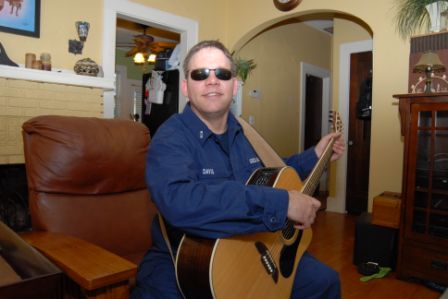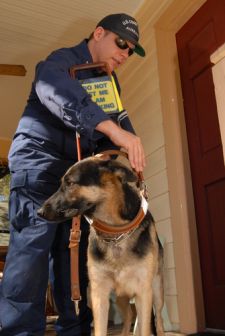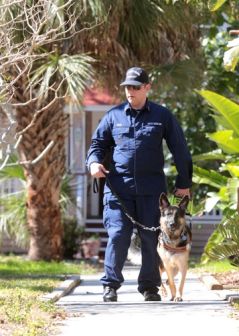

Reprinted, with permission, from the February issue of Coastline, a District 7 USCG Publication.
 |
| Auxiliarist Eric Davis |
ST. PETERSBURG, Fla. – On a sunny day in St Petersburg, Fla., Eric Davis smiles widely, and takes a deep breath. “You gotta love this weather,” said the native Midwesterner.
Legally blind since birth, Davis has Retinopathy of prematurity. One of four adopted children, he credits his parents with his ability to overcome challenges.
A United States Coast Guard Auxiliarist for the past two years, Davis, 35, has an affinity for the outdoors, a passion for public service, a mind for factoids and a great sense of humor. Affable and outgoing, Davis is the quintessential people person. That’s exactly why members of Flotilla 78 on St. Pete Beach, call Davis “a high-value asset”.
“Eric is a magnet for people and does a great job at boat shows,"says Vice Flotilla Commander, Valerie Fernandes. Davis says he’s fascinated by the military and especially, the Coast Guard’s humanitarian missions. “It was the opportunity to serve others and a new experience that offered new skills and the chance to broaden my horizons that held appeal,” he says.
At Ball State University in Muncie, Ind., Davis majored in general studies. His curiosity led him to minor in military science, industrial technology, history and counseling psychology. Most recently, he worked in technology support on a product related to voice feedback for the visually impaired. Recently laid off, he’s currently job hunting. “I enjoy working and helping people - but not being stuck behind a desk,” he says.
 |
| Auxiliarist Davis and his guide dog Payton |
Right on cue, he straightens his Coast Guard ball cap, ready to walk down the stairs to his 1925 Craftsman home, his loyal dog Payton, a German Shepherd, at his side. The dog accompanies Davis and his wife, Patti, to Auxiliary meetings. Though the dog has a flotation vest, she is not a boat crew member, for safety reasons. But just like Davis, she relishes having a purpose. At home and in public, Payton anticipates Davis’ moves, watching and listening intently. “She’s very attentive and also very energetic,” says Davis, who also makes it a point to try and debunk stereotypes about the visually impaired.
It all comes down to visualization and conceptualization of your environment,” says Davis.
By all accounts, he has a well-developed sense of spatial orientation. That, he says, comes from growing up in a tri-level house and being attuned to his other four senses. One of them is his musical ear. A piano and harmonica player who likes everything from rock to country and blues, he’s more focused on guitar these days. Smiling, he strums his prized Alvarez A.D. 70 and says he envisions few limits. “Just about everything is wide open to me,” says Davis, “It’s really about attitude.”
That’s why the fellowship and camaraderie of the Auxiliary holds appeal. His wife, a software developer, concurs. “… We were very taken by the “'blindness' to Eric's blindness, by his Flotilla Commander, Brad Marchant,” she says. “It was refreshing, and I could sense that Eric was very excited about feeling an immediate sense of belonging.”
That made Davis feel instantly comfortable. An avid reader, he has a Braille display on his computer as back-up to the text-to-speech feature, but he sometimes uses the Talking Book device sponsored by the Library of Congress. Recently, he finished books by W.E.B. Griffin and Tom Clancy. His phone and computer read him messages, allow him to keep an up-to-date phone book, calendar and keep track of time. As for matching clothing, he says he double checks with his wife. And when he dons his uniform, he’s extra careful about pinning on his name tag.
“Why do you think I like ODUs?” he quips, referring to the name tags and collar devices that are sewn on.
Recently, Davis completed the Boating Skills and Seamanship course. Once he gets someone to read the Auxiliary Specialty Course/Seamanship to him, he plans to take that as well. “I want to know everything I can so I can be a better guardian,” he says.
Davis says being visually impaired is mostly an asset. “Appearances don’t matter and therefore, aren’t a barrier,” he says. “It sort of levels the playing field and makes educating people about boating safety easier.”
Fernandes agrees. "Eric's forte is in Public Affairs,” she says. “He has the superior ability to engage people as they walk by our static displays.” She also says his dog is a draw for kids. And that, says Davis, means he can start educating even the youngest boaters.
 |
 |
| Payton- a German shepherd and guide dog for Auxiliarist Eric Davis- intently awaits her next command | Taking Payton out for some exercise |
~CC 03/04/11